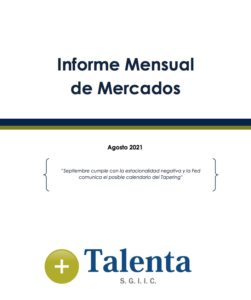Key aspects
Traditionally, September shows a negative seasonal pattern, being one of the worst months of the year for stocks. In 2021 this was no exception. The stock market indices yielded on average close to 4.0%, highlighting the technological Nasdaq, dropping 5.73%. The Chinese real estate developer Evergrande was one of the main generators of volatility as it was close to default. It is the second promoter in the country by size, it has a liability of 300,000 million USD (it represents 2.4% of Chinese GDP). The company was unable to meet its coupon commitments and is concerned about the lack of a clear position from the Chinese government on a possible bailout, as well as the global contagion effect.
The long-awaited Fed meeting brought with it a first draft of the timetable for the Tapering. The reduction of the purchase program would be announced the following month, beginning in December and ending in June 2022. This would imply reducing purchases by 20,000 million each month. Another important message is the decoupling of Tapering to future rate hikes, something that is not expected until the end of 2022 at the earliest.
The Fed’s announcement had a negative impact on the debt market, increasing the 10Y US IRR to levels of 1.56%. For its part, European debt continued with the price declines (IRR rebound) that began in mid-August. The contagion effect on corporate debt was evident, causing both Investment Grade and High Yield to underperform in September. Known inflation figures are still very high, both in Europe (+ 3.0% year-on-year) and in the United States (+ 5.3% year-on-year). Taking into account the deterioration in confidence indicators and the expected slower growth rate, a stagflation scenario is highly probable for the coming months.
In Germany, the federal elections resulted in the victory of the Social Democratic party SPD with 25.7% of the votes compared to 24.10% of the Conservatives of the CDU. Despite the shift to the left and the end of the Merkel era, the market received the result positively. This is because the winner is the current Minister of Finance and the entry of radical parties from both the left and the right seems out of the question.
Click to see the whole report:


